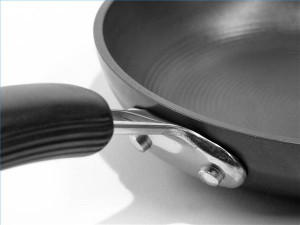Teflon, once called the housewife’s best friend by DuPont, is a synthetic polymer polytetrafluoroethylene (PTFE) that gives pan their non-stick coating. While avoiding stuck on food and hard to clean pans sounds like a positive thing, it should be noted that when Teflon pans are used incorrectly they can emit 15 different toxic gases. One of the main chemicals used in the manufacturing of Teflon and other nonstick pans is Perfluorooctanoic acid (PFOA). This chemical, also known as C-8, has led to cancer and birth defects in lab animals. In 2005, an independent panel reported to the EPA that PFOA was a likely carcinogen. DuPont maintains that their Teflon coated pans are safe when used properly, that is not allowed to exceed to 360oC , the temperature at which PFOA is released. However in 2003, EWG emissions tests showed that a nonstick pan’s recommended temperatures could easily be exceeded in just two to five minutes on a conventional stove top. Outside of cancer, other health problems associated with the incorrect usage of non-stick pans include smaller birth weights in infants, elevated cholesterol levels, abnormal thyroid hormone levels, liver inflammation and weakened immune defense against disease. If you are stuck using non-stick use the following safety tips: [1]
[1]
- Never preheat nonstick cookware at high heat — empty pans can rapidly reach high temperatures
- Cook at the lowest temperature possible to prepare your food safely
- Avoid putting nonstick cookware in an oven hotter than 500 degrees
- Use an exhaust fan over the stove when cooking
- Skip the self-cleaning function on your oven as it cleans by heating to high temperatures, which can release toxic fumes from non-stick interior oven parts
There is no need to worry about ingesting PTFE flakes that may come off of your non-stick pans as these particles are inert or non-reactive thus will not harm you. If you are able to, invest in safer cookware such as stainless steel, cast iron and porcelain.
Another potentially dangerous cooking vessel to be aware of is plastic. Many plastic containers contain Bisphenol A, also known as BPA. There is growing evidence that BPA is dangerous, especially for developing children. Possible adverse health effects of using BPA products include early puberty onset in girls, mood disorders and reduced brain cell connections that are vital to memory and learning. The National Health and Nutrition Examination Survey (NHANES) conducted in 2003-2004, detected BPA in more than 90 percent of Americans it tested. Using this data, researchers linked higher BPA concentrations to additional adverse health effects, including cardiovascular disease, type II diabetes, and clinically abnormal concentrations of some liver enzymes. You can avoid BPA and other potentially unsafe plastics by discarding any containers with recycling numbers 3, 6, or 7 on them. Most recycling numbers can be found on the bottom of the plastic container. When microwaving with plastics be sure they are microwave safe. Never use old food containers such as a cottage cheese container for heating in the microwave. If possible opt for glassware in the microwave. Cooking healthy ingredients with safer cookware will lead to a happy, healthier you!
Research Assistance Provided by: Sarah Volling [2]
Resources:
www.ewg.org/healthyhometips/dangersofteflon
